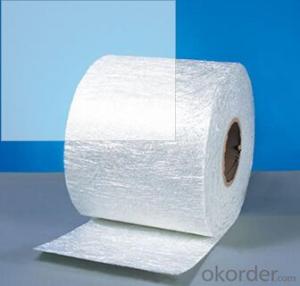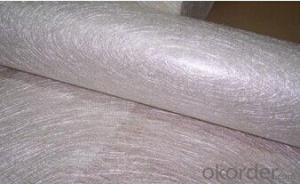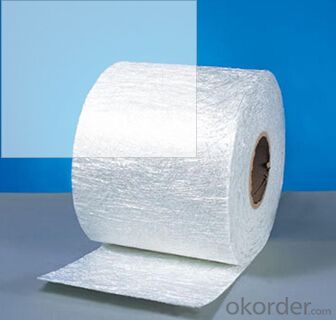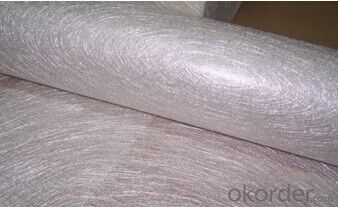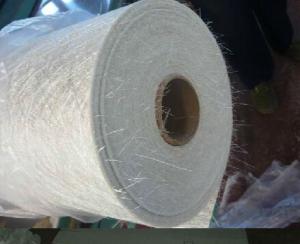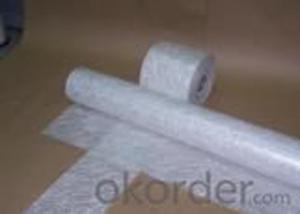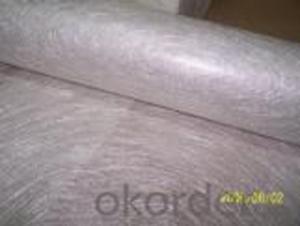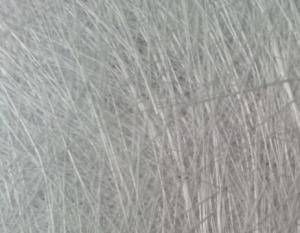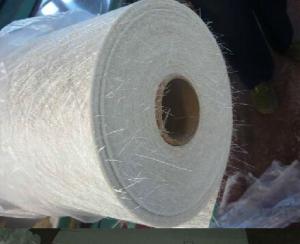Fiberglass Mat Tissue C-Glass Chopped Strand Mat-Powder 1000mm
- Loading Port:
- China Main Port
- Payment Terms:
- TT or LC
- Min Order Qty:
- -
- Supply Capability:
- -
OKorder Service Pledge
OKorder Financial Service
You Might Also Like
Structure of Chopped Strand Mat Description
Glass Fiber Powder Binder Chopped Strand Mat is an unwoven fabrics consisting of randomly distributed chopped strands held together with powder binder.Powder Chopped Strand Mats are compatible with unsaturated polyester, vinyl ester, phenol and epoxy resins.
The products are widely used in hand lay-up process and can also be used in compression molding and continuous laminating process and fixed table laminating process. The typical end-use applications include various panels, boats, bathroom accessories, automotive parts and cooling towers.
Main Features of E-glass Chopped Strand Mat
1.Strong bond fibers,providing high dimensional stability ans easy handing .
3.Good moldability,fast and complete resin wet-out ,enabling high productively .
4.Good transporsision and hign strength of the composite products.
5.Even thickness ,no fuzz ,no stain.
6.Fast wet-out ,products with high strength ,little loss for strength in damp situation.
E-Glass Chopped Strand Mat Images
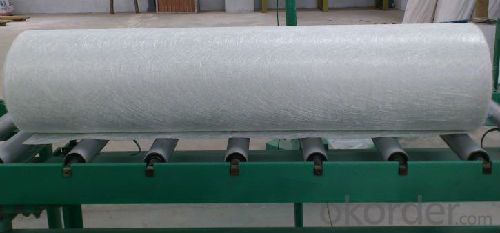
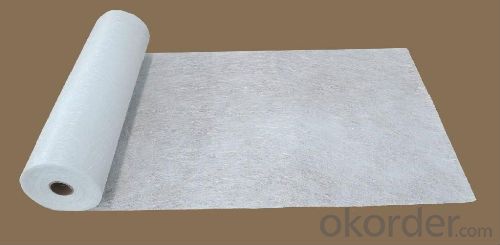
E-Glass Chopped Strand Mat Specification:
Specs | Roll length(m) | Width(mm) | Roll weight(kg) | Compatible Resin |
EMC225 | 1040mm | 144 | 30 | UP VE |
EMC300 | 1040mm | 96 | 30 | UP VE |
EMC380 | 1040mm | 80 | 30 | UP VE |
EMC450 | 2080mm | 64 | 60 | UP VE |
EMC600 | 2080mm | 48 | 60 | UP VE |
EMC900 | 2080mm | 32 | 60 | UP VE |
FAQ of Chopped strand mat
1. Why Choose us?
CNBM is a stated own company, provide the guarantee for the best quality, best service and safety business.
2. How will we guarantee the quality?
a, ISO 9001-2008 quality control system;
b, Strict and regular quality control in production;
c, Inspeciation when loading into container before shippment;
d, Sample stock for one year for quality tracing and record.
3. What is your MOQ?
Our MOQ is one pallet.
4. Can you provide sample?
Yes, samples are in stock. we can offer free sample for you.
5. Payment terms?
We can accept L/C, T/T etc.
6. Do you offer OEM service?
Yes, we can print customers’ logo on the packaging;
And the size and specification can be produced and design according to your demand.
7. What is the Production Lead Time?
1 *40HQ each day.
- Q: Can fiberglass mat tissue be used for lightweight construction?
- Yes, fiberglass mat tissue can be used for lightweight construction. It is a versatile material that offers high strength-to-weight ratio, making it suitable for various applications where weight reduction is desired without compromising structural integrity. Its lightweight nature enables easier handling, installation, and transportation, making it an ideal choice for lightweight construction projects.
- Q: How does fiberglass mat tissue perform in terms of chemical resistance?
- Fiberglass mat tissue is renowned for its exceptional chemical resistance capabilities. This material is typically composed of glass fibers held together by a binder, enabling it to withstand a wide range of chemicals. This makes it a popular choice as a reinforcement in composite materials, like fiberglass-reinforced plastics (FRP), as it can endure exposure to various chemicals without degradation. The level of chemical resistance in fiberglass mat tissue can vary depending on its specific type, quality, and the chemicals it encounters. However, it generally exhibits high resistance to acids, alkalis, solvents, and other corrosive substances. This quality makes it suitable for applications where the material may come into contact with aggressive chemicals, such as in chemical processing plants, water treatment facilities, or storage tanks. It is important to acknowledge that while fiberglass mat tissue is generally chemically resistant, it may not be completely impervious to all chemicals. Certain highly concentrated or specialized chemicals may still have the potential to cause damage or deterioration over time. Therefore, it is always advisable to consult the manufacturer's specifications and recommendations for detailed information on chemical resistance before utilizing fiberglass mat tissue in a particular application. All in all, fiberglass mat tissue's robust chemical resistance properties establish it as a dependable option for applications involving chemical exposure.
- Q: Is fiberglass mat tissue resistant to moisture vapor transmission?
- Yes, fiberglass mat tissue is resistant to moisture vapor transmission.
- Q: What are the different types of fiberglass mat tissue available?
- There are several different types of fiberglass mat tissues available, each with its own unique characteristics and applications. Some of the most common types include: 1. Chopped Strand Mat (CSM): This is the most basic and widely used type of fiberglass mat tissue. It consists of randomly oriented chopped strands of fiberglass held together with a binder. CSM is typically used in applications where strength and resilience are important, such as boat building and automotive parts manufacturing. 2. Continuous Filament Mat (CFM): Unlike CSM, CFM is made from continuous strands of fiberglass that are woven into a mat. This type of fiberglass mat tissue offers excellent tensile strength and dimensional stability, making it ideal for applications that require high strength and stiffness, such as aerospace components and wind turbine blades. 3. Surface Veil Mat: Surface veil mat is a very thin and lightweight type of fiberglass mat tissue that is used primarily for surface finishing and reinforcement. It is typically applied as a final layer in composite laminates to improve the surface smoothness and water resistance. 4. Stitched Mat: Stitched mat is made by interweaving continuous strands of fiberglass with a stitching thread. This construction provides increased strength and improved drapability, making it easier to conform to complex shapes. Stitched mat is commonly used in applications that require a combination of strength and flexibility, such as in the production of pipes and tanks. 5. Binderless Mat: Binderless mat is a specialty type of fiberglass mat tissue that does not contain any binders or resins. Instead, the fibers are mechanically bonded together using a needling process. This makes binderless mat highly resistant to chemical attack and suitable for use in corrosive environments, such as chemical storage tanks and pipes. These are just a few examples of the different types of fiberglass mat tissues available. The choice of which type to use depends on the specific requirements of the application, including strength, flexibility, surface finish, and resistance to various environmental factors.
- Q: Can fiberglass mat tissue be used for making furniture?
- No, fiberglass mat tissue is not suitable for making furniture. It is primarily used in composite materials and construction applications, not for furniture manufacturing.
- Q: Can fiberglass mat tissue be used for electrical insulation?
- Fiberglass mat tissue can indeed serve as electrical insulation due to its impressive properties. Composed of fine glass fibers, this non-woven fabric possesses exceptional electrical insulation capabilities. Its ability to endure high temperatures and exhibit a high dielectric strength renders it ideal for a range of electrical applications. For instance, it finds regular use as an insulation material in electrical transformers, motors, generators, and other electrical equipment. By creating a barrier that hinders the passage of electrical current, the fiberglass mat tissue safeguards the components against potential electrical shocks or short circuits. Moreover, it boasts resistance against moisture, chemicals, and UV radiation, thereby further enhancing its suitability for electrical insulation purposes.
- Q: How is fiberglass mat tissue used in the production of storage containers?
- Fiberglass mat tissue is commonly used in the production of storage containers due to its unique properties and benefits. Firstly, the fiberglass mat tissue is a thin layer of non-woven fibers made from glass, which provides excellent strength and durability. This makes it an ideal material for reinforcing the structure of storage containers, ensuring they can withstand heavy loads and resist deformation. Additionally, fiberglass mat tissue is highly resistant to corrosion, moisture, and chemicals. This makes it particularly suitable for storage containers that may be exposed to harsh environments or contain corrosive substances. The fiberglass mat tissue acts as a protective barrier, preventing any potential damage or degradation to the container. Furthermore, fiberglass mat tissue is lightweight, making it easier and more cost-effective to transport and handle during the production process. It also contributes to the overall weight reduction of the storage container, allowing for increased payload capacity and more efficient storage and transportation. In terms of production, the fiberglass mat tissue is typically applied to the surface of the storage container during the molding process. It is often impregnated with a resin or adhesive, which, when cured, forms a strong bond with the container, enhancing its structural integrity. Overall, fiberglass mat tissue plays a crucial role in the production of storage containers by providing strength, durability, corrosion resistance, and weight reduction. Its versatility and unique properties make it a preferred choice for manufacturers aiming to produce high-quality and long-lasting storage containers.
- Q: Can fiberglass mat tissue be used for reinforcing swimming pools?
- Yes, fiberglass mat tissue can be used for reinforcing swimming pools. It is commonly used in the construction of pool shells to provide added strength and durability.
- Q: Can fiberglass mat tissue be used for roofing applications?
- Yes, fiberglass mat tissue can be used for roofing applications. Fiberglass mat tissue is a lightweight and flexible material that is commonly used in the construction industry for various purposes, including roofing. It is often used as a reinforcement layer in roofing systems to enhance their strength and durability. The fiberglass mat tissue is typically impregnated with bitumen or other waterproofing agents to create a water-resistant barrier on the roof. It also helps to improve the fire resistance and thermal insulation properties of the roof. Moreover, fiberglass mat tissue is resistant to mold, mildew, and other common roofing issues, making it an ideal choice for roofing applications.
- Q: Is fiberglass mat tissue suitable for insulation in residential buildings?
- Yes, fiberglass mat tissue is suitable for insulation in residential buildings. Fiberglass mat tissue is a type of insulation material that is made from glass fibers and is commonly used in residential buildings due to its excellent thermal properties. It has a high R-value, which means it provides effective insulation by reducing heat transfer, keeping the interior of the building warm during winter and cool during summer. Fiberglass mat tissue is also known for its durability and long lifespan, making it a reliable choice for residential insulation. It is resistant to moisture, mold, and pests, ensuring a healthy and comfortable living environment. Additionally, fiberglass mat tissue is lightweight and easy to install, making the insulation process efficient and cost-effective. Furthermore, fiberglass mat tissue is fire-resistant, which is an essential feature for residential buildings. It acts as a barrier, preventing the spread of fire and protecting the occupants and property from potential hazards. Overall, fiberglass mat tissue is a suitable and popular choice for insulation in residential buildings due to its thermal efficiency, durability, fire-resistant properties, and ease of installation.
Send your message to us
Fiberglass Mat Tissue C-Glass Chopped Strand Mat-Powder 1000mm
- Loading Port:
- China Main Port
- Payment Terms:
- TT or LC
- Min Order Qty:
- -
- Supply Capability:
- -
OKorder Service Pledge
OKorder Financial Service
Similar products
Hot products
Hot Searches
Related keywords
